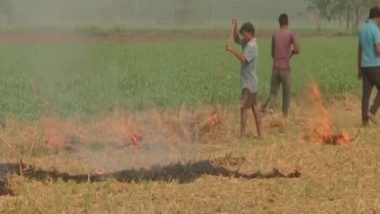Chandigarh, September 15: AAP governments in Punjab and Delhi have come together to combat stubble burning, for which they will soon be launching a pilot project to manage crop residue. Under the project, a bio decomposer will be sprayed on 5,000 acres in the state, an official statement said on Thursday.
Punjab Agriculture and Farmer Welfare Minister Kuldeep Singh Dhaliwal said high-level meetings were held in New Delhi over the issue.
On Wednesday, Dhaliwal met Delhi Chief Minister Arvind Kejriwal regarding the management of the pollution caused by stubble burning. Later, he held deliberations with Delhi's Environment Minister Gopal Rai. According to the statement, the pilot project will be launched jointly by governments of both states.
The Punjab agriculture minister said under the process, a Pusa bio decomposer will be sprayed on stubble following which the crop residue gets mixed in the soil. He said the Punjab government has made adequate preparations to prevent pollution caused by paddy stubble. Equipment are being provided to farmers on subsidy, awareness and surveillance teams have been formed in all districts. Delhi Schools Recorded 16% Increase in Pass Percentage in CBSE Class 10 Compartment Exam, Says Govt.
Targeting the Union government for "turning down" cash incentive proposal to farmers for not burning stubble, he said the state government had proposed to give Rs 2,500 per acre to paddy growers suggesting that the Centre should bear Rs 1,500 of the proposed amount.
He said a massive awareness drive will be launched in the rural belt of Punjab, comprising officials of the Department of the Rural Development and Panchayat and the Punjab Pollution Control Board to persuade farmers to manage the stubble. Stubble Burning: 56,000 Machines to Be Distributed, Massive Awareness Prog, Says Punjab Minister Kuldeep Singh Dhaliwal.
Dhaliwal urged farmers to give fulsome support to the government to protect the land, air and water so that the future generations could enjoy a clean environment. Paddy straw burning in Punjab and Haryana is a major reason behind the alarming spike in air pollution levels in the national capital in October and November. Delhi Govt Introduces Student Advisory Board in Its Schools.
Farmers set their fields on fire to quickly clear off the crop residue before cultivating wheat and potato. Punjab generates around 20 million tons of paddy straw annually. In 2020, scientists at the Indian Agricultural Research Institute had come up with a Pusa bio decomposer, a microbial solution, which can decompose stubble and turn into manure in 15-20 days. The Delhi government had provided it free to farmers in the capital to manage stubble in non-basmati rice fields in 2020 and 2021.













 Quickly
Quickly





















